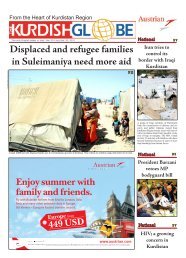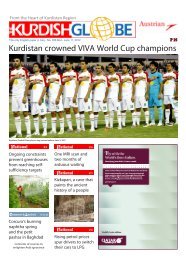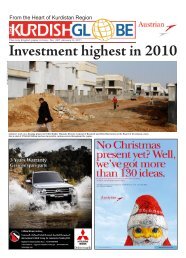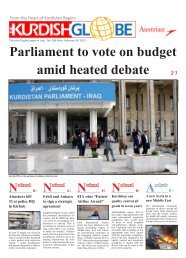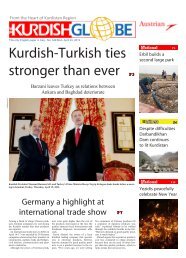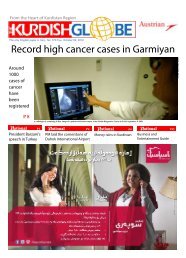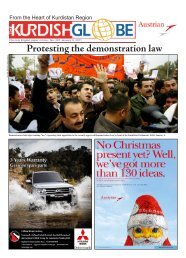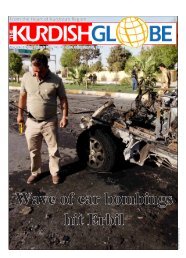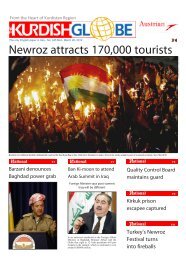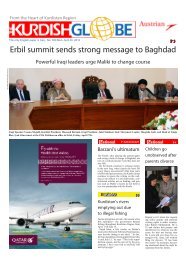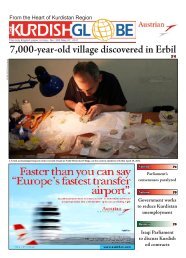KDP confirms government rotation - Kurdish Globe
KDP confirms government rotation - Kurdish Globe
KDP confirms government rotation - Kurdish Globe
You also want an ePaper? Increase the reach of your titles
YUMPU automatically turns print PDFs into web optimized ePapers that Google loves.
The <strong>Kurdish</strong> <strong>Globe</strong> No. 335, Saturday, January 07, 2012 14<br />
Iran and Turkey divided<br />
by ‘Arab Spring’<br />
Relationships in the region are changing<br />
By Salah Bayaziddi<br />
sbayaziddi@yahoo.com<br />
It was almost 18 months<br />
ago that a divided United<br />
Nations Security Council<br />
voted to tighten sanctions<br />
against Iran over its nuci<br />
clear program. It mostly<br />
failed because both Turki<br />
key and Brazil, non-permi<br />
manent members of the<br />
UN Security Council,<br />
resisted U.S.-led efforts<br />
to push through further<br />
sanctions over Iran’s failui<br />
ure to halt its uranium enri<br />
richment program. While<br />
it was not the first attempt<br />
by the international commi<br />
munity to curb nuclear<br />
proliferation in one of the<br />
most volatile regions of<br />
the world, it was alarming<br />
news for the West where<br />
one of the most trusted alli<br />
lies in the Muslim world<br />
and a member of NATO<br />
is siding with Iran. At the<br />
time, when Turkey voted<br />
against the further sancti<br />
tions of Iran on June 9,<br />
2010, the policy makers<br />
in the region feared the<br />
possibility that the new<br />
Turkish policies were<br />
linked to a sharp break<br />
from its secular tradition<br />
and pro-Western stance.<br />
Nevertheless, there are<br />
many signs that the warm<br />
relations between these<br />
two neighboring counti<br />
tries is changing in nature<br />
and it is moving from a<br />
relationship of rivalry<br />
to one based on animosi<br />
ity and adversary. In line<br />
with such new developmi<br />
ments, an Iranian political<br />
official threatened to atti<br />
tack Turkey's NATO missi<br />
sile defense system if the<br />
U.S. or Israel attacks Iran,<br />
repeating a similar threat<br />
from a general a month<br />
ago.<br />
It was on Sept. 2 when<br />
Turkey’s Foreign Ministi<br />
try announced the counti<br />
try would host an early<br />
warning radar as part of<br />
a NATO defense system,<br />
which will help protect<br />
against ballistic missile<br />
threats and is part of a<br />
strategic initiative agreed<br />
upon in 2011. Then it was<br />
reported that a military<br />
installation in the Turkish<br />
town of Kurecik, about<br />
700 kilometers west of<br />
the border with Iran, has<br />
been chosen as the radar<br />
site. Tehran has made<br />
clear its displeasure at<br />
Turkey's decision to depi<br />
ploy a NATO missile earli<br />
ly warning system, which<br />
Iran sees as a U.S. ploy<br />
to protect Israel from any<br />
counterattack, should the<br />
Jewish state target Iran's<br />
nuclear facilities.<br />
This war of words beti<br />
tween Iran and Turkey’s<br />
officials became more<br />
serious when Vice-Chairmi<br />
man of the Iranian Parliami<br />
ment's National Security<br />
and Foreign Policy Commi<br />
mission Hussein Ibrahim<br />
said Iran is making plans<br />
to finding ways to neuti<br />
tralize the NATO missi<br />
sile defense system to be<br />
installed in Turkey, and<br />
warned that in the case<br />
of any attack on Iran, it<br />
will definitely hit that<br />
system. In December, Isli<br />
lamic Revolution Guards<br />
Corps Aerospace commi<br />
mander Brig. Gen. Amir<br />
Ali Hajizadeh underlined<br />
Iran's crushing response<br />
to any enemy aggression,<br />
and warned that Tehran<br />
would target the NATO<br />
missile shield in Turkey<br />
if it comes under attack.<br />
"We have prepared oursi<br />
selves, if any threat is<br />
staged against Iran, we<br />
will target NATO's missi<br />
sile shield in Turkey and<br />
will then attack other<br />
targets," Brig. Gen. Haji<br />
jizadeh said, addressing a<br />
gathering of 10,000 Basij<br />
(volunteer forces) membi<br />
bers in the western town<br />
of Khorramabad in late<br />
November.<br />
However, there must<br />
more stories inside this<br />
new round of rivalry<br />
games between Iran and<br />
Turkey. As a clear indici<br />
cation, the rise of “Arab<br />
Spring” and the new Turki<br />
key’s policy toward the<br />
Syrian regime has played<br />
a major role in changing<br />
hearts of these once close<br />
friends. Indeed, Turkey<br />
and Iran, the Middle East's<br />
two major non-Arab Musli<br />
lim states, are vying for<br />
influence in the post-Arab<br />
Spring region and it was<br />
Iranian President Mahmoud Ahmadinejad shakes hands with Turkish Foreign Minister Ahmet Davvutoglu<br />
at the presidential office in Tehran on January 5, 2012.<br />
enough to show its serioi<br />
ousness when Iranian Supi<br />
preme Leader Ayatollah<br />
Ali Khamenei's military<br />
adviser accused Turkish<br />
Prime Minister Recep<br />
Tayyip Erdogan of setti<br />
ting its foreign policy to<br />
please Washington. It was<br />
in the early stages of the<br />
anti-<strong>government</strong> protests<br />
across Middle East and<br />
North African countries<br />
when the Iranian regime<br />
clearly was trying to porti<br />
tray a different view, and<br />
in fact a more suitable<br />
one, to its political ideoi<br />
ology across the Islamic<br />
world. In the beginning, it<br />
was viewed that the Arab<br />
uprisings had been mainli<br />
ly secular in nature. But<br />
Khamenei claimed they<br />
represented an "Islamic<br />
awakening" against dictati<br />
torial, Western-backed regi<br />
gimes, inspired by Iran's<br />
1979 Islamic Revolution.<br />
But it seems Tehran is fulli<br />
ly aware its own model of<br />
a purportedly democratic<br />
Islamic <strong>government</strong> has<br />
little appeal in the Arab<br />
world.<br />
Turkish pressure on<br />
Syria, Tehran's main ally<br />
in the Arab world, has angi<br />
gered the Iranian regime.<br />
Erdogan, with a vision of<br />
a moderate Islamic poli<br />
litical system, has taken a<br />
tough and proactive stand<br />
against Syrian President<br />
Bashar al-Assad's bruti<br />
tal response to the ninemonth<br />
Syrian uprising.<br />
The Turkish premier<br />
predicted recently that<br />
the Syrian leader will be<br />
ousted "sooner or later,”<br />
and is set to impose its<br />
own sanctions on Damasci<br />
cus. Turkey is also harbi<br />
boring Syrian opposition<br />
groups and army defecti<br />
tors. Clearly, Iran has a<br />
huge interest in the survi<br />
vival of Assad's regime.<br />
His removal could sever<br />
Iran's umbilical cord to<br />
Hezbollah, Tehran's coreli<br />
ligionist ally in Lebanon,<br />
which gives the Islamic<br />
republic a cherished presei<br />
ence on Israel's northern<br />
ATTA KENARE/AFP/Getty Images<br />
border and enables Iran<br />
to project its power in<br />
the region. Making the<br />
situation worse was Turki<br />
key's decision to deploy<br />
the NATO missile early<br />
warning system, which<br />
has the potential to cause<br />
more difficulty to already<br />
troubled relations of these<br />
rival countries.<br />
Now with the new devi<br />
velopments in hand, and<br />
with the arrival of this<br />
new phase of post-sancti<br />
tions of the UN Security<br />
Council, the prospect of<br />
future diplomatic efforts<br />
are more uncertain then<br />
ever before but most impi<br />
portantly, the role of Turki<br />
key will become more<br />
crucial toward Iran’s<br />
nuclear crisis. At the momi<br />
ment, it seems also all<br />
options in responding to<br />
Iran's nuclear ambitions<br />
are wide open, and the<br />
further intensification of<br />
this problem will lead the<br />
entire region to the edge of<br />
a full-scale regional confi<br />
flict. Further complicating<br />
the crisiss, it is crucial to<br />
remember that Israel has<br />
long viewed Tehran as its<br />
greatest strategic threat<br />
because of Iran's nuclear<br />
program and its current<br />
president, who frequently<br />
has predicted the destructi<br />
tion of the Jewish state.<br />
Until now, both Israel and<br />
the U.S. have refused to<br />
rule out a military option<br />
to halt Iran's nuclear capi<br />
pabilities. At these histori<br />
ical moments, the policy<br />
makers are reviewing this<br />
crucial question: How<br />
will Turkey respond to<br />
any military strike against<br />
Iran? It was not long ago<br />
when, following the appi<br />
proval of more sanctions<br />
against Iran, the Turkish<br />
<strong>government</strong> announced its<br />
refusal to accept any militi<br />
tary action against Iran<br />
because it would create<br />
another Iraq and this time<br />
result in a wider regional<br />
war and bleak future for<br />
the entire region.



